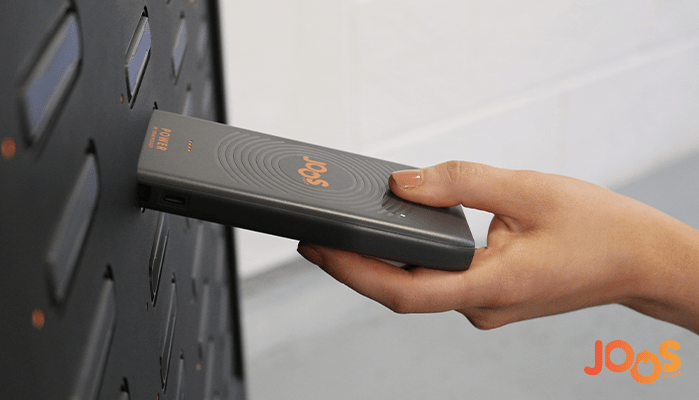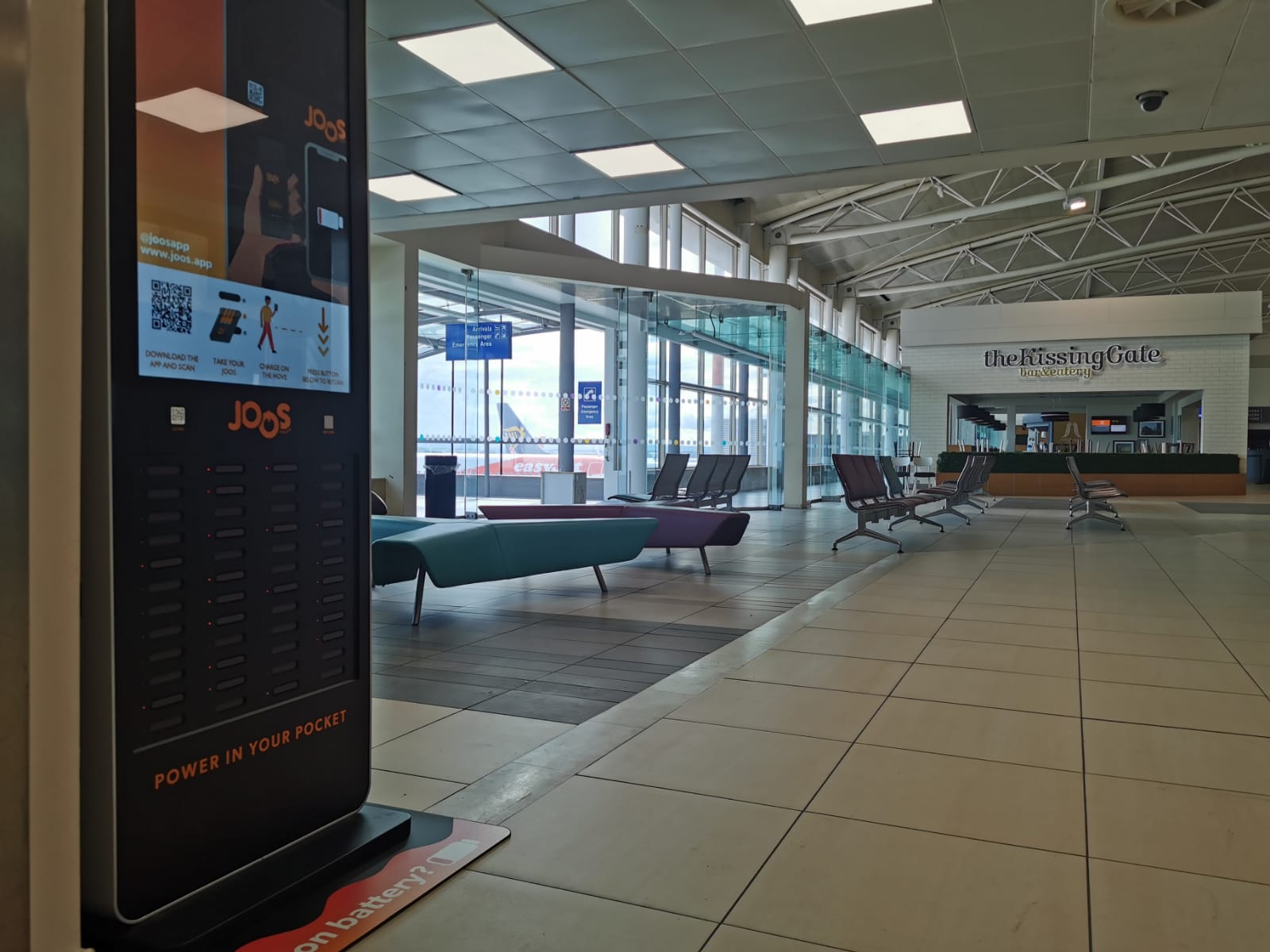
The travel sector is slowly restarting and passenger reliance on technology, such as for e-tickets, contactless payment options and vaccine passports, has increased due to the impact of the pandemic. It is more important than ever for passengers to have access to charging facilities within an airport environment.
Liverpool John Lennon Airport has become one of the first airports to introduce Joos, a phone charging service that enables passengers to charge their devices on the move throughout the airport. The charging facility comes in the form of a power bank rental service which allows passengers to walk around the airport while charging their phone, instead of previous technology which saw passengers waiting by power points.

Discover B2B Marketing That Performs
Combine business intelligence and editorial excellence to reach engaged professionals across 36 leading media platforms.
We speak to Josh Baah, co-founder, Joos, and Lucy O’Shaughnessy, commercial director at Liverpool Airport, to find out how passengers can access the charging tech and its key benefits.

Frankie Youd (FY): How do passengers access the Joos portable chargers?
Josh Baah (JB): It’s simple, a passenger would download Joos from Google Play or the App Store. Once they have downloaded Joos they can sign in, it’ll link to their Gmail, Facebook, or Apple ID; whatever is easiest. They would put in a payment method, again it can be linked to their Apple Pay, Google Wallet, etc.
Then they scan the QR code on the station and press ‘rent now’, a charger will pop out. The entire process of downloading the app to getting your power bank, can be done within 90 seconds or so.

US Tariffs are shifting - will you react or anticipate?
Don’t let policy changes catch you off guard. Stay proactive with real-time data and expert analysis.
By GlobalDataThey’ve got three cables to charge every smartphone on the market. We’ve got the USB-C, for the latest Google/ Huawei phones, an Apple Lightning cable. We’re the only Apple-certified provider offering this service in Europe with official Apple cables. Lastly, we have a standard micro-USB charger for most android devices.
FY: How are the devices returned after use?
JB: We have our stations landside and airside, so before the passengers go through security and by the gates. When ready, you press the return button – a light then flashes letting them know which slot you should return it to. Slot it back in, job done. It will say ‘return successful’, and the passenger will get a receipt saying: “Thanks for charging with Joos” just like you would with an Uber.
FY: What are the main benefits of this method of phone charging?
Lucy O’Shaughnessy (LS): We have had phone charging stations in the past but what we liked about this were the flexibility and mobility – the passenger doesn’t have to remain stationary with their phone. We also believe, post Covid-19, access to vaccine passports, ‘fit to fly’ certificates and information will be vital in travel starting up again and we’re trying to make the passenger experience as easy as possible.
JB: I think it’s the mobility. The world has become more interconnected with smartphones. We are at a point where people don’t want to lock their phone away for 30 minutes in a charging locker, they also don’t want to sit waiting by a plug/socket, so Joos really allows that ability to charge on the move. I’d say that’s really the crux of why a customer would rather go to Joos than find a USB socket.
Another point that I should probably flag is that there’s a lot more awareness about something called ‘Juice Jacking’. Any public USB port can be infected by malware by a virus. Someone can go to a public USB port, then ‘infect’ that socket with a virus – if someone goes to put their cable in even for five seconds, the malware can actually transfer to your phone. Joos provides safe charging. We use charging cables, not data cables in order to avoid such risks.
FY: What steps are being taken to mitigate the spread of Covid-19 between the battery packs?
JB: We have a few measures to mitigate the spread. Once a power bank is returned by a user, that power bank won’t be released to the public for 72 hours. The reason why we picked 72 hours is that’s the lifespan of Covid-19 on plastics. What’s great is that – because we’re a tech company – we have control over all of our systems, we can adjust that as things get better. We can reduce that to 48 hours, and eventually 24, and eventually get to the point whereby it’s not as much of a concern.
In addition, we made our products with antimicrobial plastic. This is a medical-class material that is used within the NHS, and again, reduces the lifespan of not just Covid-19 but any virus or any bacteria on a surface due to the plastic composition. That’s something that only we could do because we have full control over our supply chain. We’ve developed it all, during Covid-19 so we made sure that it’s safe.
FY: What are the main benefits of Joos over other charging options?
JB: We noticed that the charging lockers have been bought by airports across Europe, so, we already knew that there was a need in airports for charging. We realised, if airports were willing to pay a lot for these lockers to be installed and maintained, there will be a demand for Joos. We flip the model on its head, Joos is actually free for the airports.
One other alternative is wireless charging pads, however what’s terrible for them is that all other solutions are static; Joos allows the passenger to move around – charging and shopping at the same time.
LS: We have had a number of charging methods in the past, but this is the most flexible option we’ve had. Passengers can charge their devices whilst on the move and carry the power bank on their journey from check in to departures.
FY: Does the airport have any upcoming plans for further tech inclusion? What are Joos’s plans for expansion into the airport industry?
LS: As we come out of the pandemic, yes absolutely, however short-term we are focused on getting back up and running and making travel safe for our passengers.
JB: We’re speaking to a number of UK airports at the moment, we hope to have them signed up to Joos over the coming months, but really, we’re expanding across Europe. It’s been announced that the vaccine passports will be digital, they won’t be physical cards. As digitalisation continues airports are going to have to increasingly invest in a charging solution – as we’re the only provider Approved by Apple and with anti-Covid-19 measures – we hope to fulfil that demand.





